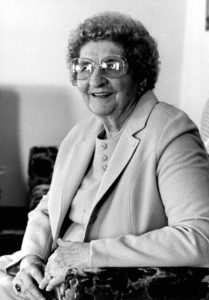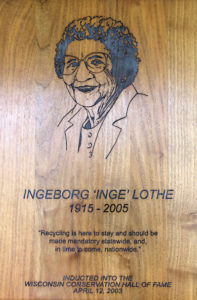1915 – 2005
Inducted 2003
“The air we breathe, the water we use, the energy needed, recreation, transportation. All involve natural resources and conservation.” – Ingebord Lothe
Recycling is a household world in much of Wisconsin today, but it wasn’t always so. It took the work of people like Ingeborg “Ingie” Lothe of Poynette to make this happen. Lothe was a Wisconsin recycling pioneer. She was also an early leader in efforts to broaden the audience for environmental education at home and across the country. At the national level, she took the conservation message to women through activities with the General Federation of Women’s Clubs.
Hers was the classic Wisconsin farm background. Born in 1915, she grew up on a farm in rural Sun Prairie and attended a one-room school for her early years of education. She and her husband, Irvin, were dairy farmers and fur farmers in Columbia County for four decades. In 1970, Ingie and Irvin stopped farming, and her calendar quickly filled with civic activities. Wisconsin’s conservation history is all the richer for that fact.
She helped steer Columbia County government toward wise conservation decisions, especially recycling. She served on and chaired the county Solid Waste Commission, which made recycling a reality. The county also adopted a model composting project. The county’s recycling program was recognized by the National Recycling Coalition in 1986 as the “Most outstanding recycling program in the nation.” It also served as a model for other recycling programs coming to life around the state. Well before Wisconsin adopted a statewide recycling program, Lothe said this: “Recycling is here to stay and should be made mandatory statewide, and, in time to come, nationwide.”
She became Wisconsin Federation of Women’s Clubs president in 1970. Her theme was “For a Better Environment.” She also served as national conservation chair for the General Federation of Women’s Clubs through much of the 1970s, leading conservation training sessions and workshops for women from around the country.
“It takes education to keep issues in front of the public; environmental education never ends,” Lothe said in a 1990 interview. At home, her love for the MacKenzie Environmental Center in Poynette led Lothe to take a major role in setting up the Department of Natural Resources’ first “Friends” program. She organized the Friends of the MacKenzie Environmental Center in 1978. It’s a concept that has been repeated many times for state natural areas.


